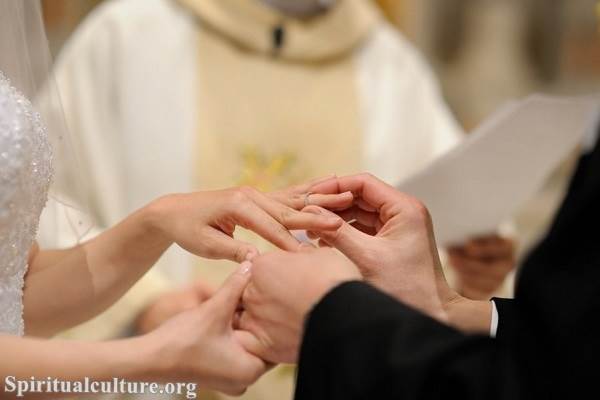This covenant is intended to be permanent and exclusive and is ordered for the good of the spouses and the procreation and education of children.
According to Catholic teaching, the primary purpose of marriage is to bring children into the world and to educate them in the Catholic faith. The secondary purpose of marriage is to provide mutual support and companionship for the spouses.
Catholic beliefs on marriage
The Catholic Church views marriage as a sacrament and a lifelong union between a man and a woman. It is based on mutual love, respect, and support, with the goal of helping each other to grow in holiness and to reach heaven.
The Church teaches that marriage is indissoluble, meaning that it is permanent and cannot be dissolved except by death. The Catholic Church requires a valid form of sacramental marriage, witnessed by a priest or deacon, for a marriage to be considered valid in the eyes of the Church.
The Church also teaches that sexual intimacy should only occur within the context of a valid marriage and that it is ordered towards procreation and the expression of love between the married couple.

In addition to these core beliefs, the Catholic Church has a number of teachings and practices related to marriage. For example, the Church encourages couples to receive the sacrament of matrimony regularly, to pray together, and to raise their children in the Catholic faith. The Church also offers resources and support to married couples, including pre-marriage preparation programs and support groups for those experiencing challenges in their marriage.
The Catholic Church also holds strong views on issues related to marriage and family, such as contraception, divorce, and same-sex marriage. The Church teaches that the use of artificial contraception is morally wrong and that divorce is only acceptable in cases of marital breakdown or infidelity. The Church does not recognize same-sex marriages, viewing them as contrary to natural law and God’s plan for marriage and family.
Overall, the Catholic Church views marriage as a sacred bond that reflects the love between Christ and his Church. Through the sacrament of matrimony, couples are called to live out their faith and to serve as examples of Christ’s love for all.
Catholic marriage rules
There are several rules for Catholic weddings. Here is more detail on the rules for Catholic weddings:
– Both couples must be baptized and at least one of them must be a Catholic. This is because the Catholic Church views marriage as a sacrament that should be entered into by two baptized individuals.
– The wedding must take place in a Catholic church. This is to emphasize the meaning of the sacrament and the fact that the couple is making a commitment to God as well as to each other.
– Both couples must complete a pre-marriage course and obtain a marriage license. The pre-marriage course is designed to help the couple prepare for their life together and understand the meaning of the sacrament of marriage. The marriage license is a legal requirement that proves the couple is eligible to be married.
– The wedding ceremony must be conducted by a Catholic priest or deacon. This ensures that the sacrament is performed in accordance with the teachings and beliefs of the Catholic Church.
– The couple must exchange vows and exchange rings during the ceremony. This symbolizes the couple’s commitment to each other and their union.
– The couple must also receive the Eucharist together during the ceremony. This symbolizes their shared commitment to God and the fact that their union is rooted in their faith.
– The couple must not be related within the prohibited degrees of consanguinity or affinity. This is to ensure that the marriage is valid under Church and civil law.
It’s important to note that these rules may vary slightly from one diocese to another and that the couple should consult with their priest or deacon for specific requirements in their area.
